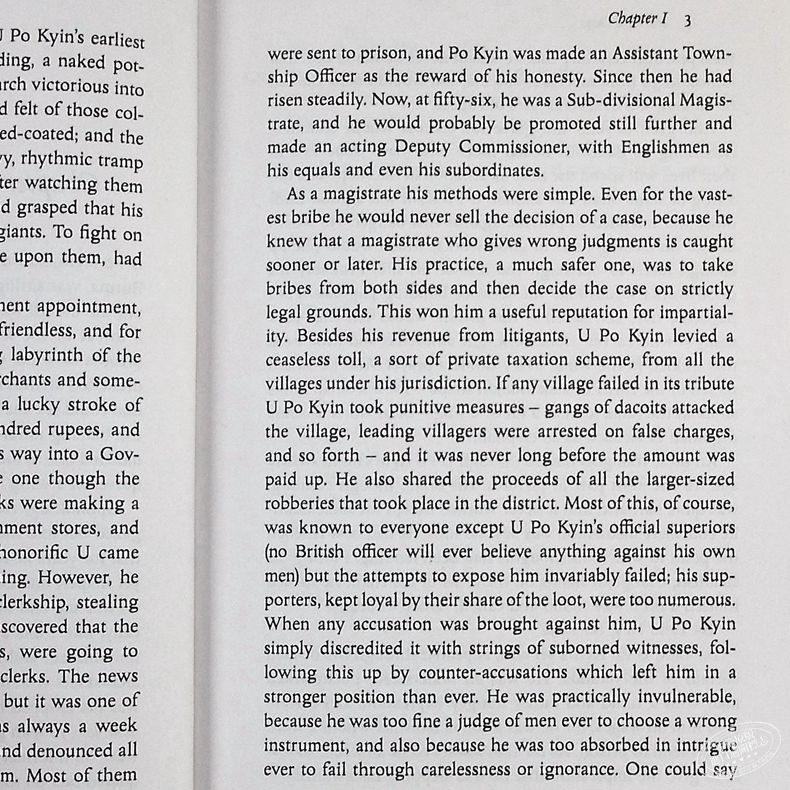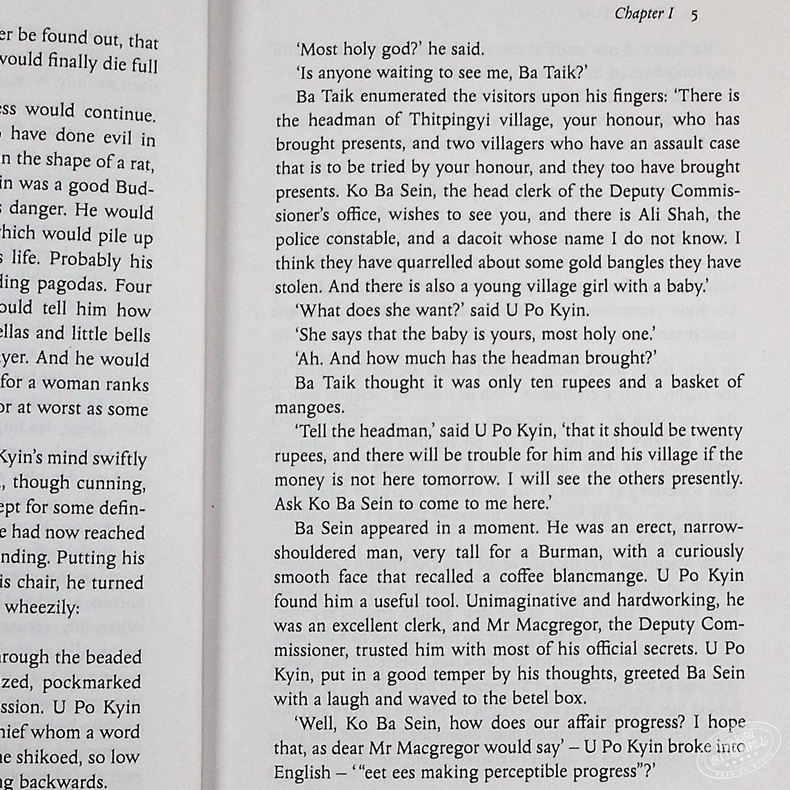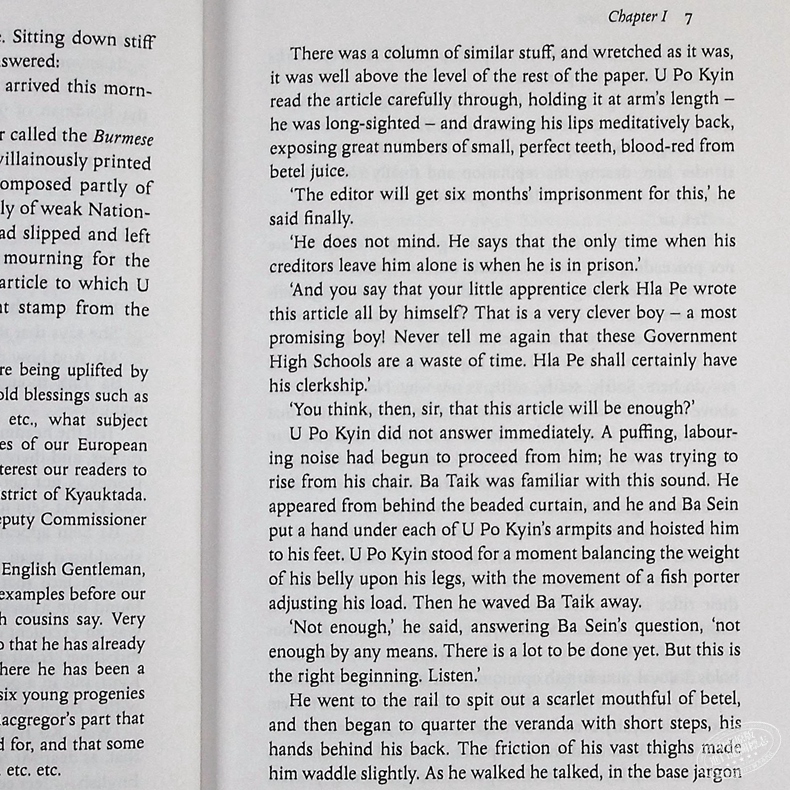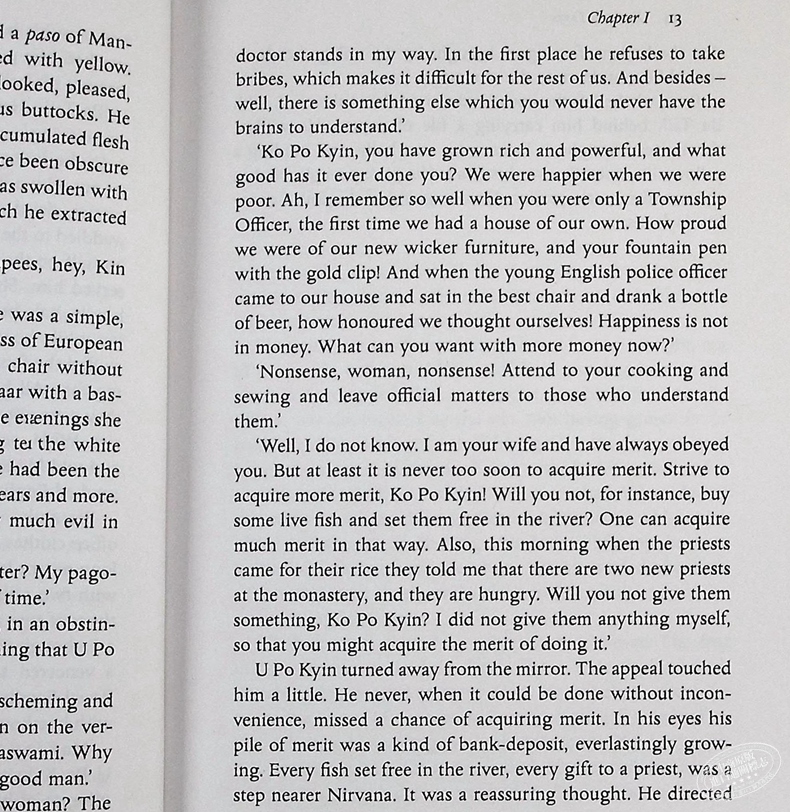【中商原版】[英文原版]Burmese Days 缅甸岁月 George Orwell乔治·奥威尔
¥67.50
| 运费: | 免运费 |
| 库存: | 2 件 |
商品详情
Burmese Days [平装]
~ George Orwell (作者)
基本信息
出版社: Penguin Classics (2001年11月29日)
外文书名: 缅甸岁月
丛书名: Penguin Modern Classics
平装: 320页
语种: 英语
ISBN: 0141185376
条形码: 9780141185378
商品尺寸: 1.5 x 12.8 x 19.3 cm
商品重量: 227 g
商品描述
编辑推荐
Amazon.com Review
Imagine crossing E.M. Forster with Jane Austen. Stir in a bit of socialist doctrine, a sprig of satire, strong Indian curry, and a couple quarts of good English gin and you get something close to the flavor of George Orwell's intensely readable and deftly plotted Burmese Days. In 1930, Kyauktada, Upper Burma, is one of the least auspicious postings in the ailing British Empire--and then the order comes that the European Club, previously for whites only, must elect one token native member. This edict brings out the worst in this woefully enclosed society, not to mention among the natives who would become the One. Orwell mines his own Anglo-Indian background to evoke both the suffocating heat and the stifling pettiness that are the central facts of colonial life: "Mr. MacGregor told his anecdote about Prome, which could be produced in almost any context. And then the conversation veered back to the old, never-palling subject--the insolence of the natives, the supineness of the Government, the dear dead days when the British Raj was the Raj and please give the bearer fifteen lashes. The topic was never let alone for long, partly because of Ellis's obsession. Besides, you could forgive the Europeans a great deal of their bitterness. Living and working among Orientals would try the temper of a saint."
Protagonist James Flory is a timber merchant, whose facial birthmark serves as an outward expression of the ironic and left-leaning habits of mind that make him inwardly different from his coevals. Flory appreciates the local culture, has native allegiances, and detests the racist machinations of his fellow Club members. Alas, he doesn't always possess the moral courage, or the energy, to stand against them. His almost embarrassingly Anglophile friend, Dr. Veraswami, the highest-ranking native official, seems a shoo-in for Club membership, until Machiavellian magistrate U Po Kyin launches a campaign to discredit him that results, ultimately, in the loss not just of reputations but of lives. Whether to endorse Veraswami or to betray him becomes a kind of litmus test of Flory's character.
Against this backdrop of politics and ethics, Orwell throws the shadow of romance. The arrival of the bobbed blonde, marriageable, and resolutely anti-intellectual Elizabeth Lackersteen not only casts Flory as hapless suitor but gives Orwell the chance to show that he's as astute a reporter of nuanced social interactions as he is of political intrigues. In fact, his combination of an astringently populist sensibility, dead-on observations of human behavior, formidable conjuring skills, and no-frills prose make for historical fiction that stands triumphantly outside of time. --Joyce Thompson
Review
Orwell can write - he proved it in Down and Out in Paris and London. He has an all-seeing eye, and is not fooled by glamorous whitewashing. And in Burmese Days he has written a malodorous, realistic novel of the white man in the east, as he really is. Granted all that, but after all what has he told that has not been told before, many times since Kipling painted a different picture. And the story itself is not particularly worth telling. (Kirkus Reviews) --This text refers to an out of print or unavailable edition of this title.
作者简介
Eric Arthur Blair (George Orwell) was born in 1903 in India, where his father worked for the Civil Service. The family moved to England in 1907 and in 1917 Orwell entered Eton, where he contributed regularly to the various college magazines. From 1922 to 1927 he served with the Indian Imperial Police in Burma, an experience that inspired his first novel, Burmese Days (1934). Several years of poverty followed. He lived in Paris for two years before returning to England, where he worked successively as a private tutor, schoolteacher and bookshop assistant, and contributed reviews and articles to a number of periodicals. Down and Out in Paris and London was published in 1933. In 1936 he was commissioned by Victor Gollancz to visit areas of mass unemployment in Lancashire and Yorkshire, and The Road to Wigan Pier (1937) is a powerful description of the poverty he saw there. At the end of 1936 Orwell went to Spain to fight for the Republicans and was wounded. Homage to Catalonia is his account of the civil war. He was admitted to a sanatorium in 1938 and from then on was never fully fit. He spent six months in Morocco and there wrote Coming Up for Air. During the Second World War he served in the Home Guard and worked for the BBC Eastern Service from 1941 to 1943. As literary editor of the Tribune he contributed a regular page of political and literary commentary, and he also wrote for the Observer and later for the Manchester Evening News. His unique political allegory, Animal Farm was published in 1945, and it was this novel, together with Nineteen Eighty-Four (1949), which brought him world-wide fame. George Orwell died in London in January 1950.







- 中商进口商城 (微信公众号认证)
- 中商进口商城为香港联合出版集团旗下中华商务贸易公司所运营的英美日韩港台原版图书销售平台,旨在向内地读者介绍、普及、引进最新最有价值的国外和港台图书和资讯。
- 扫描二维码,访问我们的微信店铺
- 随时随地的购物、客服咨询、查询订单和物流...
![【中商原版】[英文原版]Burmese Days 缅甸岁月 George Orwell乔治·奥威尔 商品图0](https://img01.yzcdn.cn/upload_files/2021/04/16/FlGcGRLYcwdHhqjqbElcxNzW3BLv.jpg!middle.jpg)
![【中商原版】[英文原版]Burmese Days 缅甸岁月 George Orwell乔治·奥威尔 商品图1](https://img01.yzcdn.cn/upload_files/2021/04/16/FrJ_hUa7e5GadO19h-CQEDU_OrUT.jpg!middle.jpg)
![【中商原版】[英文原版]Burmese Days 缅甸岁月 George Orwell乔治·奥威尔 商品图2](https://img01.yzcdn.cn/upload_files/2021/04/16/FtiU8fC3rKPs_r3ZlH5LHMAdiNbZ.jpg!middle.jpg)
![【中商原版】[英文原版]Burmese Days 缅甸岁月 George Orwell乔治·奥威尔 商品图3](https://img01.yzcdn.cn/upload_files/2021/04/16/Fi1DjWvKL3JcTTowuDfv9FFN9q_K.jpg!middle.jpg)
![【中商原版】[英文原版]Burmese Days 缅甸岁月 George Orwell乔治·奥威尔 商品图4](https://img01.yzcdn.cn/upload_files/2021/04/16/FmcnKiHcOptlUxpuFid1u66lssZm.jpg!middle.jpg)
![【中商原版】[英文原版]Burmese Days 缅甸岁月 George Orwell乔治·奥威尔 商品图5](https://img01.yzcdn.cn/upload_files/2021/04/16/FqPsYAN6XjmxsMRZ7PJskgM4dc01.jpg!middle.jpg)
![【中商原版】[英文原版]Burmese Days 缅甸岁月 George Orwell乔治·奥威尔 商品图6](https://img01.yzcdn.cn/upload_files/2021/04/16/FgWoxOZ9UXcgWTq6O-rYDPEzyVkU.jpg!middle.jpg)
![【中商原版】[英文原版]Burmese Days 缅甸岁月 George Orwell乔治·奥威尔 商品图7](https://img01.yzcdn.cn/upload_files/2021/04/16/FnBS5GkrfKnu0kQ61cJdHz0tz7jA.jpg!middle.jpg)









